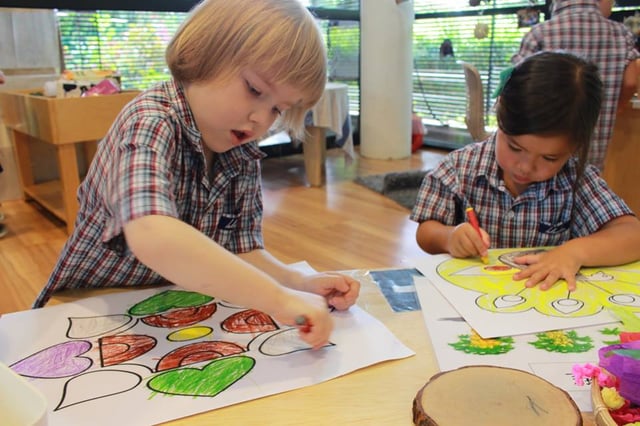
Tina Stephenson-Chin
Previous Executive Director of Pedagogy, Tina oversees Reggio Emilia (Asia) and a range of professional development initiatives. Tina has been an active contributor to popular and academic publications, in Canada and Asia, on a range of behavioral and education issues for the past 10 years. She was previously Senior Lecturer for Middlesex University London and Open University Hong Kong in teacher qualification granting programmes including their Honours B.A. in Early Childhood Studies – the only bachelor’s degree in education from a foreign institution fully-accredited in Hong Kong. She is also a member of the Ontario College of Teachers in Canada and The National College of Teaching and Leadership in the U.K.
Most parents worry that their child cannot seem to focus; that they never sit still. Many of us believe that children will do better in school if they can sit down and concentrate -- the more extended the period, the better. As a parent and an educator, I can understand these concerns. However, I also know academic strength comes from a lot of different sources and focused attention is just a small aspect to success in school. How do we encourage attention span? Here are some parenting tips.
1. Begin with physically and psychologically engaging activities
Some children prefer to listen and talk; they usually can speak and form sentences earlier than their peers. These children are more likely to concentrate on a storybook for a long time -- they may ask questions and interrupt the reader -- but they are still concentrating. Other children love to climb and jump -- and will repeat a physical skill until they get it right -- these children are also concentrating. Still, other children will sit quietly and do a puzzle, focus until it is finished, which are the only children we usually think are concentrating.
However, let's go back to the first child mentioned, the one with the storybook. That child is focussed on acquiring information and learning. If their parent or teacher encourages them to focus on listening to the book and then extend that attention by giving them lots of answers to their questions, they are extending the child’s ability to concentrate. In turn, this ability can eventually be extended to other activities which they may be less interested in.
Giving the brain opportunities to focus on interesting things helps it to develop the habits required for focussed concentration. The child kicking the ball is learning to filter out distraction, to focus on a single object, explore angle, trajectory, energy transfer and velocity and to solve the problems associated with the task at hand.
So the first step to improving concentration is, to begin with physically and psychologically engaging activities, this teaches the mind to eventually concentrate on objects that are less interesting. Concentration is a habit we acquire which can be directed at other sources, but first it is important to develop that habit and it is most logical to begin with activities which are interesting -- and then extend to less interesting or more challenging activities.
2. Limit your child's screen time
Most of us love to go home at the end of a long day, sit down, turn on the TV -- and in the process, turn off our brains. Although we focus on the TV, we are not concentrating. I believe that the TV is the enemy of concentration, even educational TV. The images flicker quickly through our brain, the sounds fluctuate rapidly, and it is an entirely passive experience.
It conditions us just to sit and passively watch, expecting rapidly moving images, which becomes increasingly fast and shocking as we become increasingly desensitised, isolating us from others and destroying our ability to concentrate on slower, quieter, focussed actions. Avoid it if you can or use it as a reward. Mostly just keep it turned off.
3. Healthy and nutritious diet
When a parent comes to me and asks about their child’s ability to concentrate, I often begin that discussion with questions about what the child eats. I believe artificial colours are among the most dangerous items we consume, especially for our neurological functions. I have followed the growing body of research on the adverse neurological and behavioural effects of artificial colouring in foods for the last two decades, and I avoid it whenever possible.
When my five-year-old comes bouncing home from a birthday party, I am always shocked and often frustrated by the radical changes in his behaviour. He tends to have poor judgment, is more likely to become injured, is more argumentative, and above all, he just can’t seem to concentrate. There are lots of treats that are colour and caffeine free; if you are serious about your child’s behaviour, I suggest you avoid these concentration-killing food additives.
4. Do not interrupt concentration in action
Children often spontaneously devote concentration to sorting out problems and improving skills, these skills arise over and over again while they are playing. My son will fix a toy, create complicated structures from Lego, and choreograph elaborate dance routines to his favourite songs -- all of which require quite a lot of focussed attention. For my part, I must resist interrupting his creative flow to ask him questions or to move him along to another activity.
Concentration like creativity, demands time to flow. The nature of concentration -- just like the nature of creativity -- is that you lose track of time and become wholly focussed on the problem or skill at hand, and that takes uninterrupted time.

Attention and concentration take on many forms: Concentration happens not just while sitting quietly, but it also occurs while talking, playing, running, jumping. There is no limit to the skills we can focus and concentrate on. I have discovered over the years that by developing one form of concentration, other forms of concentration also grow. We train our brains to focus attention through practice; whenever we concentrate on a skill or a problem, we improve our ability to concentrate.
All of us are different: We each have our interests and abilities which shape what we choose to concentrate on and for how long. First, it helps to understand the nature of focussed attention. For children, I tend to apply the 1 minute to 1-year rule -- you can expect most children to be able to concentrate on a topic or activity for about one minute per year of their developmental age. So, a four-year-old can concentrate on something for about 4 minutes; if they are interested or engaged that time can be much longer. Concentration is directly relative to their interest in the topic or activity. If we are interested in something, then we can concentrate much longer; the lesser the interest, the less time we can concentrate.


